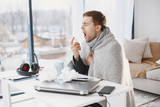Prescription Drug Addiction and Overdose
Getting addicted to and potentially overdosing on prescription drugs is a very real thing – and it doesn’t just happen to people who seek risky thrills. Even ordinary individuals taking the medications they need to live normal, happy lives without pain or sickness can fall victim to prescription drug addiction. Knowing how to prevent that from happening can save lives, not just from the detrimental effects of addiction, but also from the irreversible effects of overdose.
Unintentional and unwanted drug addiction and overdose occurs most often because ofmismanaged dosing. People make mistakes, sotreatment plans aren’t always followed to the letter. Forgetfulness, busy lives, distractions and other factors can get in the way of taking medicines, contributing toaddiction-heightening actions such as double dosing, incorrect timing and other medication errors.
Following the five practical tips below can help you prevent prescription drug addiction and overdose:
Plan Your Doses
Treatment plans rarely give you precise hours for when to take specific medications. Since people live vastly different lives, prescriptions only tell you the intervals you need to follow when taking medicines. After receiving a new prescription, take the time to plan it into your daily routine.
This is also a fantastic time to look at your medications and identify where you might make mistakes. For example, you might be prescribed 50 milligrams of a drug that is only available in 100-milligram pills. This would be the perfect time to pull out the pill cutter to precisely and accurately cut your pills so that you don’t accidentally take a double dose later.
Organize Your Pills
Keeping track of all your medicines can be difficult when you need to take more than one at a time. A common mistake involves forgetting that you already took a certain pill, causing you to take it twice in one sitting. You might also take a morning-only drug again with your afternoon pills out of force of habit. To avoid such mistakes, organize your pills with a pill sorter.
Pill sorters or organizers come in a variety of configurations. Typically designed to contain all your medications for a week, they are commonly available in once-a-day, twice-a-day and four-times-a-day options.Refill your pill organizer once a week at the same time each week instead of daily, so you don’t accidentally take doses meant for previous days.
Use Graduated Utensils
When taking liquid or powder medicines, it might be tempting to use ordinary silverware to measure out and consume your prescribed doses but doing so introduces inaccuracy. Using graduated utensils to portion exact amounts of liquid or powder medications is an effective form of prescription overdose prevention.
Graduated medicine utensils come in a wide variety of forms.
Medicine droppers allow you to administer smaller doses straight to the back of your throat, which also keeps you from tasting any undesirable flavors.Measured spoons are fantastic for taking flavored medicines.Andmedicine-dispensing pacifierscan help you give an infant the medicine he needs without much fuss.
Stock Up on First Aid Items
Finally, while not strictly in the realm ofprescription overdose prevention, stock up on any first aid items you might need in case it happens. Talk to your doctor about what might be appropriate for the medicines you are taking. Activated charcoalcan absorb prescription drugs before they enter your blood stream, so it might be useful to keep some in your first aid kit. If you are taking opioids for severe pain relief, talk to your doctor about having naloxone on hand in case of an overdosing accident.
Latest News
Why is there a cold and flu season and how to be prepared for it?
Image by prostooleh on Freepik We hear these terms being thrown around, but what is the science b...
Tips For A Safe Summer In The Sun
As people flock to the beaches and enjoy extra time in the sun, it’s important to take precautionary...
7 Best Ways to Take Care of Your Skin Naturally
Most of us have gone through a lot with our skin. Acne scars or discoloration, in general, is some...
How To Prevent Heart Disease?
Taking Care of Your Heart to Live LongerThere are almost 18 million people around the world that di...
A Quick Guide to Raising Emotionally Healthy Children
A Quick Guide to Raising your ChildWhether you’re a first-time parent or not, raising a child can g...
How Does COVID-19 Impact Your Oral Health?
The Impact of COVID-19 On Oral Health In 2000, a study was conducted by the Surgeon Gen...







